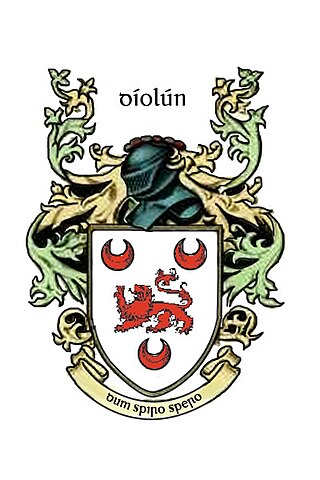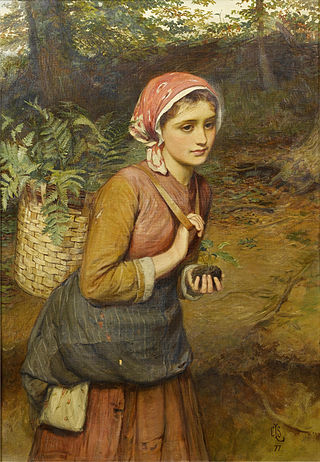Bradley is an English surname derived from a placename meaning "broad wood" or "broad meadow" in Old English.
Blair is a Scots-English-language name of Scottish Gaelic origin.
Ronald is a masculine given name derived from the Old Norse Rögnvaldr, or possibly from Old English Regenweald. In some cases Ronald is an Anglicised form of the Gaelic Raghnall, a name likewise derived from Rögnvaldr. The latter name is composed of the Old Norse elements regin and valdr ("ruler"). Ronald was originally used in England and Scotland, where Scandinavian influences were once substantial, although now the name is common throughout the English-speaking world. A short form of Ronald is Ron. Pet forms of Ronald include Roni and Ronnie. Ronalda and Rhonda are feminine forms of Ronald. Rhona, a modern name apparently only dating back to the late nineteenth century, may have originated as a feminine form of Ronald. The names Renaud/Renault and Reynold/Reinhold are cognates from French and German respectively. The name Ronaldo is a cognate from Spanish and Portuguese.
The name Zane may be a given name or a surname. Its western usage derives from the Venetian form of Gianni or an alternate spelling of the German and Jewish name Zahn. Zane can also refer to the Arabic personal name more commonly spelt Zain meaning "beautiful" or "handsome". It was popularized as a given name in the early 20th century through the American writer Zane Grey. Zayne is an alternative spelling.
This is a list of people with the surname Hutton.
Ron or Ronald Smith may refer to:
Conroy is an Irish surname.

Dillon is an Irish surname of Breton origin, descending from a cadet branch of Viscomte de Leon in Northern Brittany. It first appeared in Ireland with the arrival of Sir Henry de Leon, in the service of Prince John in 1185. Sir Henry married Maud de Courcy, daughter of Sir John de Courcy and Affrica Guðrøðardóttir. Awarded large tracts of land by in Meath and Westmeath, one of the Dillons’ first Mott & Baileys can still be found at Dunnamona before the establishment of stone structures such as Portlick Castle.
As a given name, Cory is used by both males and females. It is a variation of the name Cora, meaning "(the) Maiden", which is a title of the goddess Persephone. The name also can have origins from the Gaelic word coire, which means "in a cauldron", or "in a hollow".
Neilson is a patronymic surname meaning "son of Neil". The prefix Neil- is of Irish Gaelic origin, a genitive of 'Niall', possibly meaning "Champion" or "Cloud". Neilson, as a surname, is common in English language-speaking countries, but less common as a given name. It can be an anglicisation of MacNeil or the Scandinavian name, Nielsen.
Gillies is both a Scottish surname and a given name shared by several notable people:
The surname Finn has several origins. In some cases it is derived from the Irish Ó Finn, meaning "descendant of Fionn"; the byname means "white" or "fair-haired". In other cases it is derived from the Old Norse Finnr, a personal name sometimes derived from a byname, or else from compound names beginning with this word element. In other cases Finn is a German surname derived from an ethnic name referring to people from Finland. Notable people sharing the surname are listed below.
Landon is a personal name and surname of English origin that means "long hill". It is a variant of Langdon.
Owen is usually an anglicised variant of the Welsh personal name Owain. Originally a patronymic, Owen became a fixed surname in Wales beginning with the reign of Henry VIII. Etymologists consider it to originate from Eugene, meaning 'noble-born'. According to T. J. Morgan and Prys Morgan in Welsh Surnames: "the name is a derivation of the Latin Eugenis > OW Ou[u]ein, Eug[u]ein ... variously written in MW as Ewein, Owein, Ywein. LL gives the names Euguen, Iguein, Yuein, Ouein. The corresponding form in Irish is Eoghan." Morgan and Morgan note that there are less likely alternative explanations, and agree with Rachel Bromwich that Welsh Owein "is normally latinised as Eugenius", and that both the Welsh and Irish forms are Latin derivatives.
Calum is a given name. It is a variation of the name Callum, which is a Scottish Gaelic name that commemorates the Latin name Columba, meaning "dove".
Knox is a Scottish surname that originates from the Scottish Gaelic "cnoc", meaning a hillock or a hump or the Old English "cnocc", meaning a round-topped hill.
Jānis is a Latvian masculine given name, the equivalent of the English John. The first written use of the name Jānis dates back to 1290. It may refer to:
Māris is a Latvian masculine given name, a cognate of the English Maurice and may refer to:
Roberts is a Latvian masculine given name, cognate of the English given name Robert and may refer to:

Fern is an English topographic name from the Old English ‘’fearn’’. It refers to someone who lives among ferns. The name is used as a given name and a surname. The name is in use primarily in English-speaking countries. It has been in use since the 1800s and has also occasionally been in use for boys, though it is primarily a feminine name. There were 133 newborn American girls named Fern in 2020, 140 in 2021, and 148 in 2022. There were 26 newborn girls given the name in Canada in 2021.
This page is based on this
Wikipedia article Text is available under the
CC BY-SA 4.0 license; additional terms may apply.
Images, videos and audio are available under their respective licenses.

